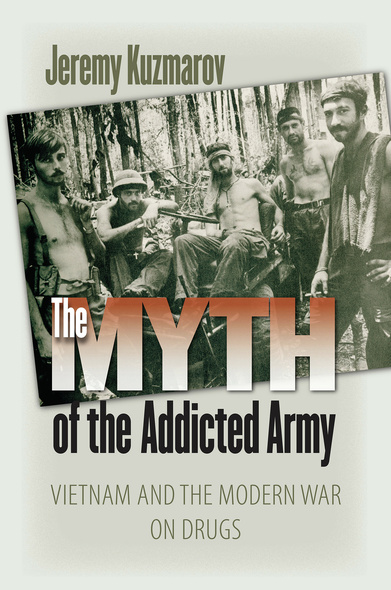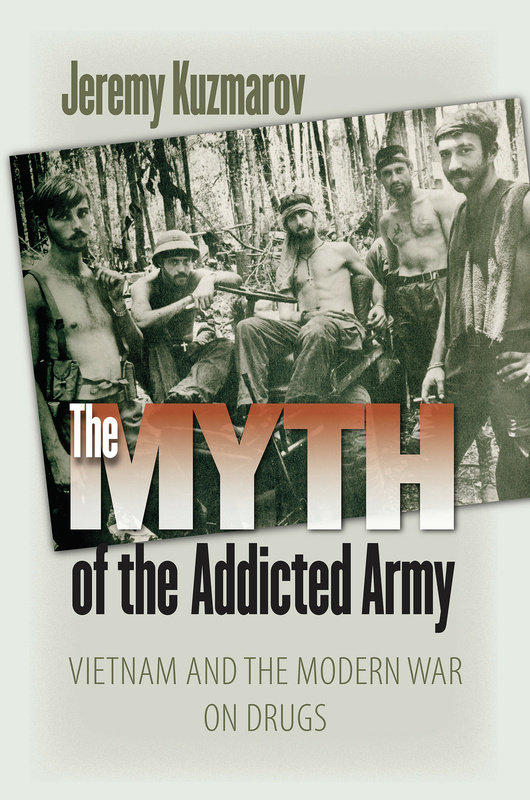The Myth of the Addicted Army
Vietnam and the Modern War on Drugs
University of Massachusetts Press
The image of the drug-addicted American soldier—disheveled, glassy-eyed, his uniform adorned with slogans of antiwar dissent—has long been associated with the Vietnam War. More specifically, it has persisted as an explanation for the U.S. defeat, the symbol of a demoralized army incapable of carrying out its military mission.
Yet as Jeremy Kuzmarov documents in this deeply researched book, popular assumptions about drug use in Vietnam are based more on myth than fact. Not only was alcohol the intoxicant of choice for most GIs, but the prevalence of other drugs varied enormously. Although marijuana use among troops increased over the course of the war, for the most part it remained confined to rear areas, and the use of highly addictive drugs like heroin was never as widespread as many imagined.
Like other cultural myths that emerged from the war, the concept of an addicted army was first advanced by war hawks seeking a scapegoat for the failure of U.S. policies in Vietnam, in this case one that could be linked to "permissive" liberal social policies and the excesses of the counterculture. But conservatives were not alone. Ironically, Kuzmarov shows, elements of the antiwar movement also promoted the myth, largely because of a presumed alliance between Asian drug traffickers and the Central Intelligence Agency. While this claim was not without foundation, as new archival evidence confirms, the left exaggerated the scope of addiction for its own political purposes.
Exploiting bipartisan concern over the perceived "drug crisis," the Nixon administration in the early 1970s launched a bold new program of federal antidrug measures, especially in the international realm. Initially, the "War on Drugs" helped divert attention away from the failed quest for "peace with honor" in Southeast Asia. But once institutionalized, it continued to influence political discourse as well as U.S. drug policy in the decades that followed.
Yet as Jeremy Kuzmarov documents in this deeply researched book, popular assumptions about drug use in Vietnam are based more on myth than fact. Not only was alcohol the intoxicant of choice for most GIs, but the prevalence of other drugs varied enormously. Although marijuana use among troops increased over the course of the war, for the most part it remained confined to rear areas, and the use of highly addictive drugs like heroin was never as widespread as many imagined.
Like other cultural myths that emerged from the war, the concept of an addicted army was first advanced by war hawks seeking a scapegoat for the failure of U.S. policies in Vietnam, in this case one that could be linked to "permissive" liberal social policies and the excesses of the counterculture. But conservatives were not alone. Ironically, Kuzmarov shows, elements of the antiwar movement also promoted the myth, largely because of a presumed alliance between Asian drug traffickers and the Central Intelligence Agency. While this claim was not without foundation, as new archival evidence confirms, the left exaggerated the scope of addiction for its own political purposes.
Exploiting bipartisan concern over the perceived "drug crisis," the Nixon administration in the early 1970s launched a bold new program of federal antidrug measures, especially in the international realm. Initially, the "War on Drugs" helped divert attention away from the failed quest for "peace with honor" in Southeast Asia. But once institutionalized, it continued to influence political discourse as well as U.S. drug policy in the decades that followed.
The Myth of the Addicted Army will contend for best-book awards in history, sociology, and many fields of policy studies. It is chock full of original research utilizing government documents and interviews with policy makers to show how the war in Vietnam incubated the myth of widespread drug addiction among U.S. troops that became, in turn, the back story to the homefront War on Drugs.'—Jerry Lembcke, author of The Spitting Image: Myth, Memory, and the Legacy of Vietnam
'What is so compelling about Jeremy Kuzmarov's book is his careful depiction of how 'the myth of the addicted army' was used for a variety of political and cultural purposes. He convincingly shows that Nixon adopted the drug policy he did in order to advance his own political fortunes, and that Nixon's drug war set the terms of the discussion in several ways. It obscured the real lack of evidence for a drug epidemic among GIs and set off an irrational response to drug use that has been a staple of American politics and popular culture ever since.'—William O. Walker, author of Drug Control in the Americas
'This is a very thought-provoking and well-executed book. . . . Kuzmarov has made a substantial contribution to our understanding of the importance of the Vietnam War on a long-standing issue with significant foreign policy implications. He has raised good issues on the continuity of the drug war and how American intervention in Southeast Asia fundamentally shaped the trajectory of the ongoing and seemingly endless struggle.'—Diplomatic History
'Kuzmarov's archival research and analysis of government documents allow the reader to question not only whether there was an addicted army, but also to question American's role in the war. . . . I recommend this book to scholars of the Vietnam War and to those who justifiably wonder how America ever became entangled in the modern War on Drugs.'—Reviews in American History
Jeremy Kuzmarov is assistant professor of history at Tulsa University.





